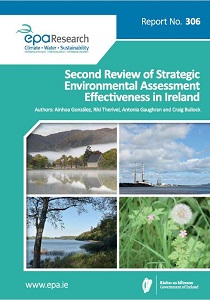Second Review of SEA Effectiveness in Ireland
Summary: The key findings and recommendations from the second review of SEA effectiveness in Ireland are presented in this report. Recommendations are included to address issues relating to guidance, training & awareness, data collection, provision & sharing and governance and legislation.

This report presents the findings of the second review of Strategic Environmental Assessment (SEA) effectiveness in Ireland. It examines SEA performance on the basis of seven effectiveness dimensions identified in the international literature: context, procedural, pluralist, normative, substantive,knowledge and learning, and transactive.
The findings of the review indicate that, broadly speaking, recent practice in Ireland seems to be more procedurally effective than reported for the case studies in the first SEA effectiveness study of 2012. Overall, SEA seems to be fulfilling its role. More governmental bodies and sectors have engaged in the SEA process and there is, generally, a greater openness to the process. This may be, in part, driven by increasing legal challenges on project consent and refusals through the Irish and European Union courts, placing more of a focus on the earlier stages of decision-making than ever before.
However, although considerable progress has been demonstrated in applying SEA in Ireland, and the SEA process is now well “bedded in”, challenges remain. The key procedural challenges identified in this review are similar to those experienced in the earlier review (EPA, 2012), notably the consideration of alternatives and monitoring.
In Ireland, monitoring remains the most significant gap in the procedure, and it is clear from the review that plan-makers and SEA practitioners are in need of clear guidance on how to develop and implement effective monitoring. SEA statement and monitoring guidance has been developed as part of this review (see Appendix 1). However, guidance, although valuable, will not be enough to address current monitoring limitations in Ireland. Plan-makers must commit to implementing monitoring programmes if future plan/programme cycles are to benefit from properly understanding environmental pressures.
Opportunities exist for better public engagement in both plan-making and the SEA process, as the statutory minimum level of consultation has not been found to be effective at engaging the public. Nevertheless, SEA is leading to changes in plans/ programmes through both direct and indirect pathways. One of the key pathways that has proved difficult to record is education and awareness raising. This intangible influence can be highly effective at refocusing planning teams to consider environmental matters. Although the Environmental Reports generally fail to capture how the policy context shapes a plan or programme, the case studies are illustrative of the generally positive and proactive approach to environmental integration in Ireland, which often results in good procedural performance and good substantive outcomes.
Based on the above findings, and additional considerations identified throughout the review, a number of strategic recommendations are put forward at the end of this report to further enhance SEA performance in Ireland over time.
https://www.epa.ie/media/epa-2020/publications/monitoring-amp-assessment/assessment/2ndEffectiveReviewImage-Small.jpg